Sebastian Bariani is in heaven, standing in his family’s olive grove in the Dunnigan Hills. The winter day is mild, a blue sky caps the rolling green terrain. He reaches down and gently bends the branch of a Manzanillo olive tree to demonstrate how the trees will soon be pruned, explaining that the blossoms for the next crop can come only from new growth.
Bariani speaks softly, as if shielding the news from the soon-to-be-snipped branch, perhaps wanting to show respect for its service. His accent is of Lombardy, Italy, though he left at 13 and is now 38.
“The harvest went late this year, all the way into January,” he says. He shrugs, tilts his head and half smiles in a whattaya-gonna-do way. “Soon we’ll begin pruning, take out the damaged trees, plant new ones.” He lets go of the branch, and it springs back to shape. He considers the march of time. “It takes six years for a newly planted tree to begin producing,” he says. There is no rushing in paradise.
By “we,” Bariani means his father, Angelo; his mother, Santa; and his brother Enrico, who lives in San Francisco. Another brother, Luigi, who comes to help during harvest, lives in Germany. He shakes his head at all that’s waiting to be done, explaining the never-ending treadmill of tending the 182 acres the family bought in 2004 and planted with Mission and Manzanillo varieties of olive trees.
Santa, Sebastian and Angelo Bariani produce their eponymous
artisan olive oil from fruit harvested by hand on their 182-acre
orchard in Zamora.
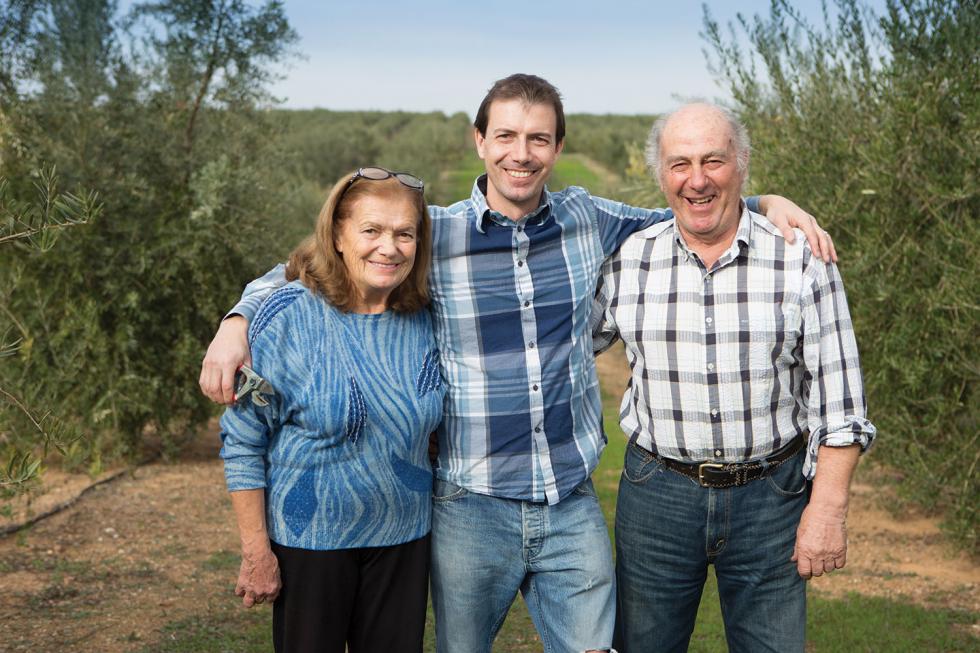
This is a hands-on operation, and the family does all the work, except for adding some extra laborers during the rush of harvest. Bariani says that during the months of harvest, he puts in 20 hours a day, six days a week, commuting from Sacramento where he lives with his wife, Lindsay, and his baby daughter, Abrielle.
All the toil doesn’t make him tired. “I am having fun,” he says. “We work hard, we’re very passionate.”
Bariani Olive Oil’s groves are tucked in the triangle of northern Yolo County near where interstates 505 and 5 meet. The very layout of the 35,000-tree orchard provides evidence of the family’s dedication to artisan methods. The well-spaced trees in each row are allowed to grow fully, though as a result they must be harvested by hand. Other larger-scale operations tightly prune their olive trees to shrubs and plant them side-by-side, packed into dense hedgerows that allow for mechanical harvesting by high-tech farm equipment.
“We’re very picky,” Bariani says. “That’s the problem we have.” Whattaya gonna do?
There are trade-offs that benefit Bariani’s methods. The mechanically harvested shrubs average only a 15-year life. The trees growing on the Bariani’s land? Well, Sebastian says, look at Greece and the ancient story of goddess Athena striking her spear into the ground, where it turned into an olive tree. Even today, a gnarled old olive tree stands where the tale was set, he says.
“In 1997, a producer of Martha Stewart’s TV show called and asked the Bariani family to send a sample of its oil and information about the company. “We didn’t know who Martha Stewart was.” Sebastian Bariani, owner, Bariani Olive Oil
Bariani Olive Oil sells its products at Raley’s/Bel-Air, Whole Foods Market, Nugget Markets, Sacramento Natural Foods Co-op, Taylor’s Market and in San Francisco at Bi-Rite Market. They can serve customers anywhere in the world from their website, barianioliveoil.com. Sebastian Bariani says the clientele for the 15,000-30,000 gallons of olive oil they extract each year is “savvy.” The company sells out of every ounce it produces. “They know food. They know quality,” he says.
At the Sunday farmer’s market under the freeway near Southside Park in Sacramento, the Bariani booth, frequently manned by Angelo, draws crowds of foodies. In San Francisco at the Ferry Plaza Farmers Market, celebrity chefs and Hollywood stars frequently seek Bariani Extra Virgin Olive Oil, Early Harvest Extra Virgin Olive Oil, White Truffle Olive Oil, balsamic vinegar, honey it produces from hives at the end of each row of olive trees, and even skin cream with an olive oil base.
The Barianis did not set out to become California olive oil legends. Emanuele’s family in Italy was involved in agriculture, but not olive oil. Angelo’s people were in construction. When the family moved from Italy to a house on four acres near Bradshaw and Gerber roads in Sacramento County, there were olive trees on the property. Sebastian says his mother decided they might as well make oil for their own use. Friends raved about the taste and spread the word, so the family started selling at the Sunday farmers market.
Then came what Sebastian Bariani calls “our five minutes of fame,” a day that changed the family’s life forever. In 1997, a producer of Martha Stewart’s TV show called and asked the family to send a sample of its oil and information about the company. “We didn’t know who Martha Stewart was,” he says. “We had been doing zero marketing.”
A crew from the show came on a November day right in the middle of harvest. Sebastian recalls being slightly annoyed. “We’re trying to work,” he says. “We have to lose a day?”
On the morning the segment aired, the phone at the Bariani office started ringing just past 5 a.m., as the show’s East Coast viewers sought to find the oil. The phone didn’t stop, not that day and not for a long time. Sebastian laughs at the memory. “They said, ‘We saw the show. We want to order your olive oil.’” Bariani Olive Oil didn’t even have a website. “We thought we’d better make one quick,” he says.
Knowing they were outgrowing their first humble home, the company acquired these 182 acres in 2004. The property, set in the folded landscape of Dunnigan Hills, has views of the Coast Range and is now nearly surrounded by the vineyards of Matchbook Winery. The family built a production facility and bought machines from Italy to clean the olives, separate stems and small branches, and extract, bottle and label the oil. They heat the building with a furnace that burns ground up olive pits. Nothing goes to waste here.
On palettes near the center of the warehouse, stacked cases of Bariani Early Harvest Extra Virgin Olive Oil shrink-wrapped in plastic wait to be shipped to Japan, Bariani’s biggest overseas customer. “The Japanese are very discerning,” Bariani says. “They want a specific flavor. This oil is from green olives, with a sharper, grassy taste. They love it. They won’t have anything else.”
He opens the lid on top of one of the machines, and points out the stems and leaves clogged in the nooks and crannies. There is cleaning to be done, everything taken apart and put back together, hours and weeks of sleeves rolled up to prepare for another season, the next harvest. Whattaya gonna do? He shrugs again, and smiles in anticipation of the work ahead.
Recommended For You
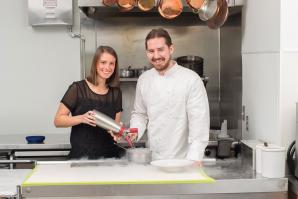
Strip Mall Molecular
In suburban Vallejo, a gastronomic gem blooms in an unlikely setting
It’s a rainy Wednesday, and Chef Michael Warring is mulling over the night’s menu in his eponymous restaurant, enjoying a moment of calm before seating begins in an elegantly appointed dining room that gives nary a hint of its former life as an ice cream parlor.
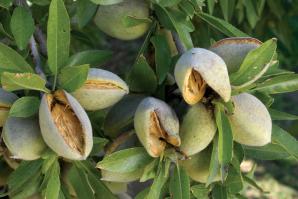
Tough Nut to Crack
Almonds bust then boom in China
Richard Waycott says there are no silver bullets in the remarkable double-digit growth of California almond exports to China but rather a carefully honed strategy built on introducing almonds to a “pre-existing snacking culture.”
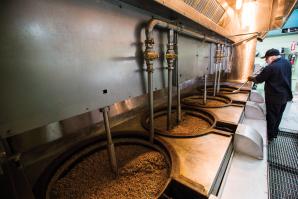
Striking Oil
In Woodland, La Tourangelle cracks the nut oil market
Pulling up to the bland business park that is home to La Tourangelle’s nut oil bottling facility gives no indication of the nexus of culinary artistry housed inside.
But step through the doors and start talking to Matthieu Kohlmeyer, the energetic founder and CEO of the Woodland company, and you’ll discover that this quiet farming town is home to a vibrant French connection and a business that’s ridden the wave of consumer health trends and successfully plugged into the farm-to-fork movement.



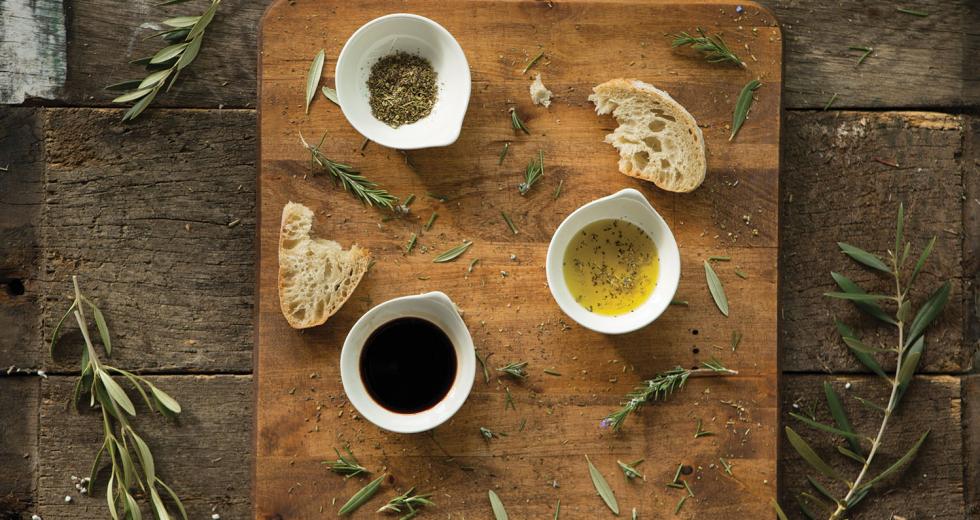
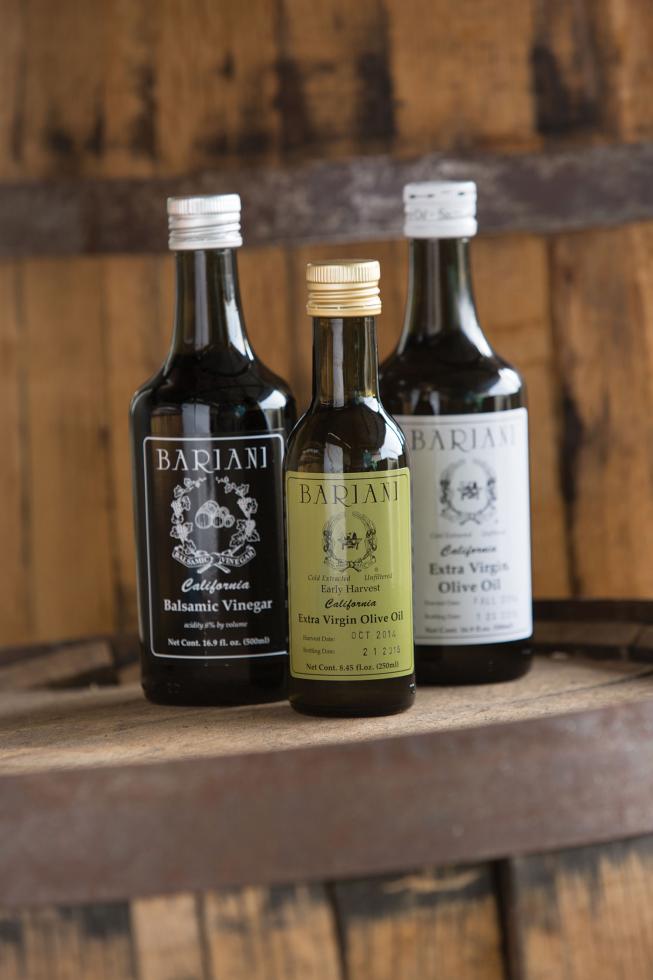
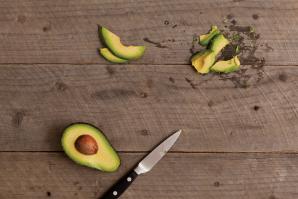
Comments
Sono felicissima del successo della vostra famiglia che ho sempre stimato. Da generazioni ha dimostrato intelligenza e lungimiranza. Un saluto particolare a Luigi, anche se non lavora con voi, che ricordo con affetto, e ad Angelo e a Santa. I miei figli si sono divertiti molto giocando con i dinosauri che la mamma Santa ha regalato loro poco prima del trasferimento a Sacramento. Spero che abbiate l'occasione di passare per Voghera e di potervi incontrare. Marilena Cabano